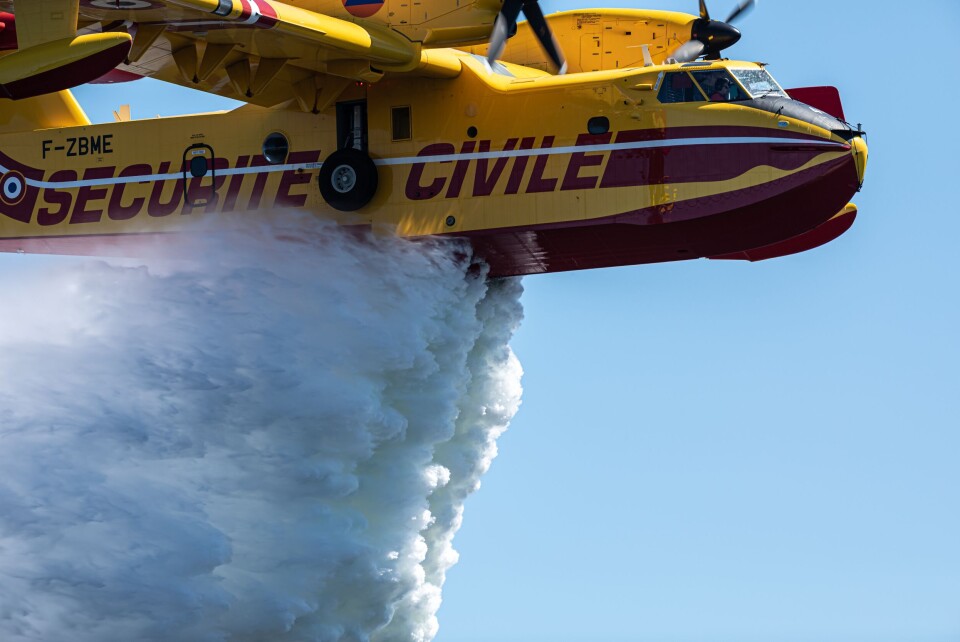-
More than 5,000 French communes use AI to identify poor rubbish sorting
Badly-sorted rubbish can cost millions so communes are turning to high-tech solutions
-
Tax on well-off retirees under consideration for 2026 budget
‘Nothing is off the table’ when it comes to finding €40 billion in savings says Labour Minister
-
Nice airport records passenger boom as tourists flock to city
Airport figures exceeded the pre-Covid record last year, with US visitors significant contributors
What resources does France have to fight forest fires?
Helicopters, planes, specialist personnel, forecasts: we look at what France has in its arsenal to tackle wildfires

After France was hit badly by forest fires last year, the government stepped up its resources to tackle the problem.
There were 72,000 hectares destroyed by fire across 50 departments nationwide in 2022.
That is the highest for at least 11 years and more than the previous four years combined, according to figures from the French government.
That prompted the government in April to commit more resources to prevent a repeat.
Here we look at what France has in its arsenal to fight forest fires.
Read more: How France wants to stop another record year of wildfires
Planes and helicopters: 47
There are nine new planes and helicopters available for forest firefighting this year, with 47 aircraft now part of the fleet, up from 38 in 2022.
- 12 Canadair planes, including two from EU aid network RescUE
- 10 water bomber helicopters, stationed in particularly at-risk areas (pictures below)
- 9 Dash planes, each with a 10,000-litre capacity tank for water or flame retardant
- 9 departmental helicopters
- 4 Air Tractor planes, which can intervene in areas that other aircraft may struggle to reach
- 3 Beechcraft planes, specialised in liaison and reconnaissance work
🚁PUMA Bravo, l'hélicoptère bombardier d'eau lourd, affrété par la @Sécurité civile, a pris ses quartiers d'été à #Jonzac (17).
— Préfet Nouvelle-Aquitaine et Gironde (@PrefAquitaine33) June 5, 2023
➡️C'est un des 1⃣0⃣ hélicoptères qui viennent renforcer les moyens nationaux de lutte contre les #feuxdeforêts. pic.twitter.com/xXsh0BZbEK
Other aircraft exist that can be used to fight fires, but they are also used for other security operations. For example, la Sécurité civile has 37 Dragon helicopters in addition to this list. These aircraft need to be close to a refuelling centre, where they can be refilled with water or flame retardant.
There are 25 of these centres, called ‘pélicandromes’ in French, spread across the country, with the majority found in the southeast.
Firefighters: 3,660
Local firefighters are always called upon first as they are closest and know the land best. However, they can receive help from national teams if needs be.
Nationwide, there are 51 designated forest firefighter units in 2023, up from 44 in 2022, comprising 3,600 firefighters.
The sécurité civile said: “Each unit is made up of 50-70 firefighters, one commandment support vehicle, and three groups of forest fire intervention teams.”
Most of these are stationed in more at-risk places, including in the south and Corsica. For example, there are 21 units in the south, but only two in the north.
The majority of these units (46 of 51) are specialised in fighting forest fires. The five others have more military-style training designed for other types of operations.
The units are also supported by ‘the Héphaïstos protocol’, which was set up in 1984 to combat forest fires in 23 departments in the south of France. It means that in 2022, there were 270 soldiers mobilised to support firefighting teams over the two summer months.
This year, the protocol was operational, and extended throughout the country, with 150 extra personnel.
Sensitive weather forecasting
In a bid to improve prevention methods, a ‘forest fire weather forecast’ was launched on June 2 this year.
During the summer, this daily forecast map shows the risk of a fire at a departmental level, with a colour code ranging from green (low) to red (very high), via yellow (moderate) and orange (high).
Read more: How does France's new wildfire risk forecast work? Where can I see it?
The forecast is primarily intended to raise public awareness and remind people that 90% of forest fires are caused by the actions of people. of the importance of doing the right thing, given that nine out of ten fires are caused by people.
The map is also used by the crisis management centre le Centre opérationnel de gestion interministérielle des Crises, which operates at the Sécurité civile base at Nîmes-Garons (Gard) and manages all aircraft for the firefighting emergency response.
This means that in the event of a very high level of fire risk in a department, aircraft can be dispatched 24 to 48 hours in advance where needed.
The roundup of forest firefighting resources comes as parts of the country remain on maximum alert for fires, and travel on trains and roads has been disrupted due to wildfires near Nice.
Read also
Warning over heightened risk of forest fires in northern France
Parts of southern France on maximum alert for forest fires
























